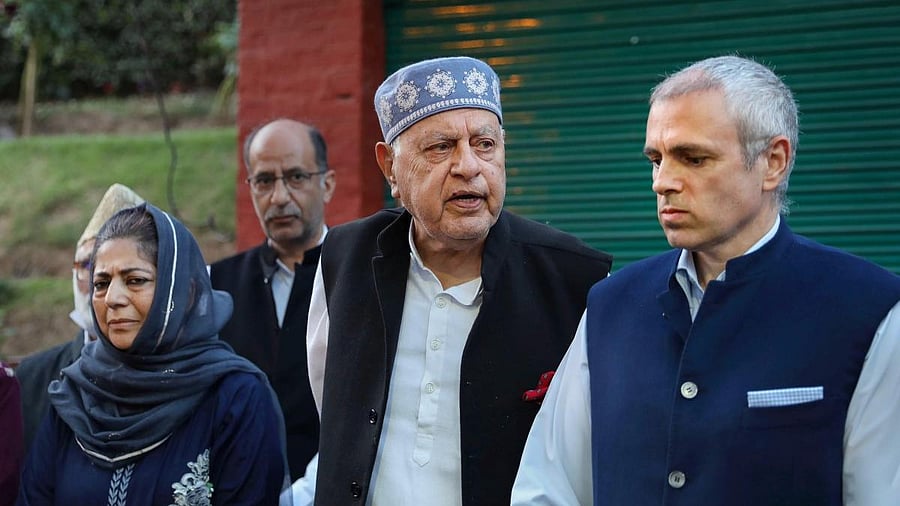
Omar Abdullah and Mehbooba Mufti with Farooq Abdullah.
Credit: PTI File Photo
Srinagar: The defeat of Omar Abdullah and Mehbooba Mufti – both former chief ministers of Jammu and Kashmir – in Lok Sabha polls marks a turning point in the region's politics, reflecting a significant shift away from dynastic politics towards a more competitive political environment.
The unexpected victory of jailed independent candidate Engineer Rashid from north Kashmir’s Baramulla Lok Sabha seat symbolizes the rise of new political voices and the potential for a more diversified representation of Kashmiri interests. As these changes unfold, the region's political future appears poised for a period of transformation, with both challenges and opportunities for governance.
Omar, the scion of Abdullah family and Mehbooba, the chief of People’s Democratic Party (PDP), have long been central figures in Kashmir's political scene. Both come from influential political families that have ruled the region for decades.
Their defeat can be attributed to several factors including disillusionment with traditional politics and widespread dissatisfaction among voters on issues like unemployment, corruption, and the handling of the Kashmir problem.
The political maneuverings and alliances made by these leaders, especially Mehbooba Mufti's alliance with the Bharatiya Janata Party (BJP), have eroded the trust of the electorate. Many viewed such alliances as betrayals of the Kashmiri interests.
Engineer Rashid, a relatively unconventional political figure, capitalized on this growing disenchantment. His victory is significant for several reasons.
Known for his grassroots activism and vocal stance on Kashmir cause resonated with a segment of the population that feels neglected by the traditional political elite. Rashid’s success underscores a broader anti-establishment sentiment.
The electoral defeat of Omar and Mehbooba, coupled with Rashid's victory, suggests several potential developments like fragmentation of traditional voting blocs. The dominance of NC and PDP might continue to wane, leading to a more fragmented political landscape. This could result in coalition governments and more complex political negotiations.
In coming times, the focus of political discourse might shift towards issues like economic development, governance, and safeguarding the land and job rights of people of J&K after the abrogation of Article 370.
On the other hand BJP decisive victory in the Jammu region signifies more than just a win at the national level. It has profound implications for the upcoming Assembly elections in J&K. This victory, which underscores the BJP's growing influence in the region, is likely to shape the political dynamics and strategies of all parties as they prepare for the Assembly polls.
The Assembly elections may see the BJP leveraging its Lok Sabha success to forge strategic alliances, particularly with smaller parties and influential local leaders.